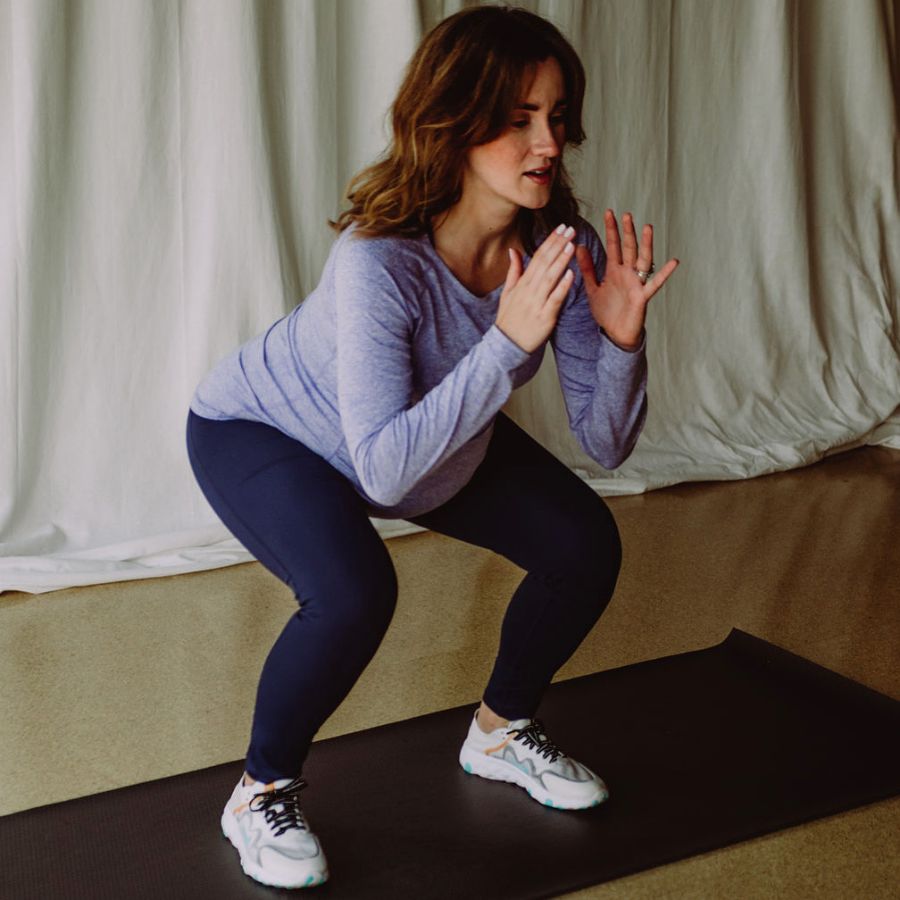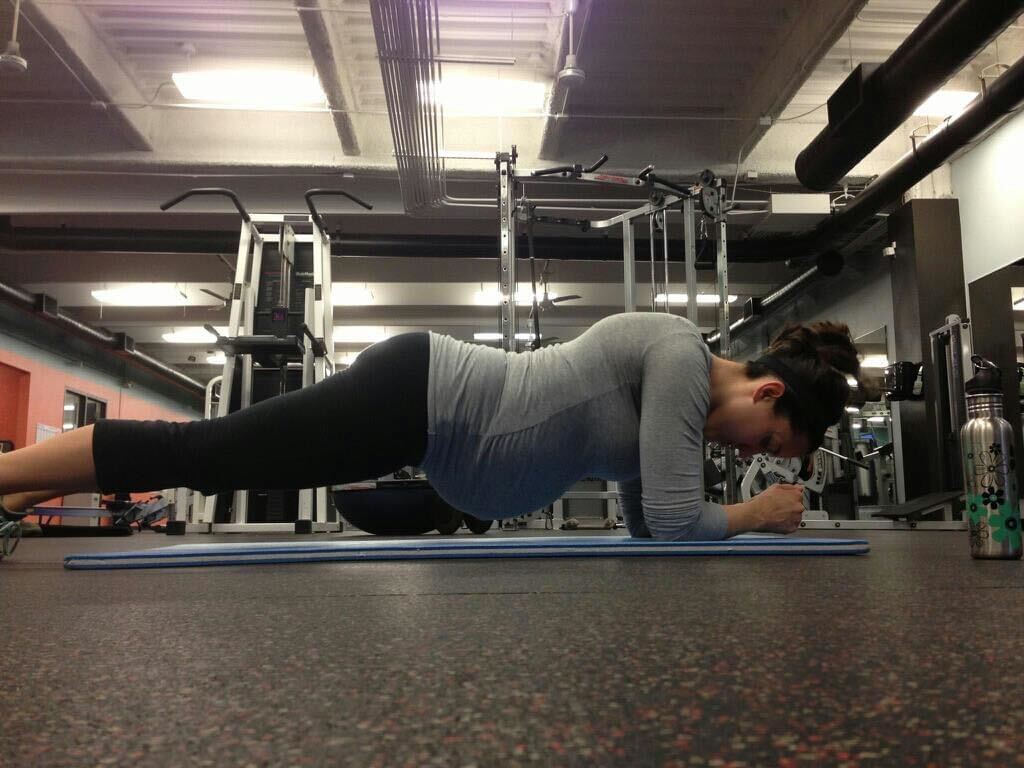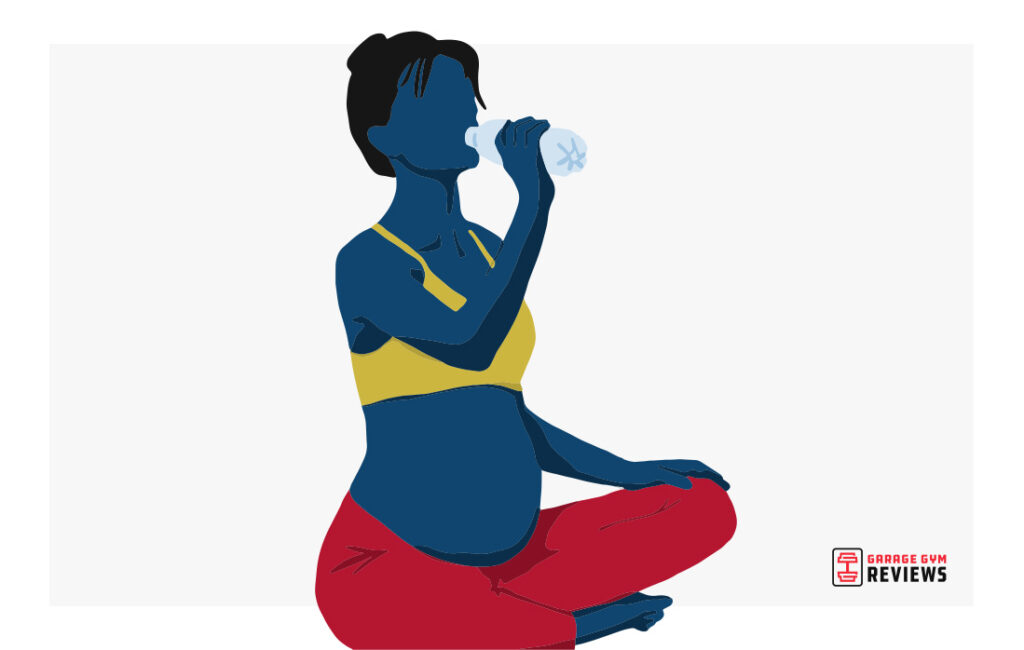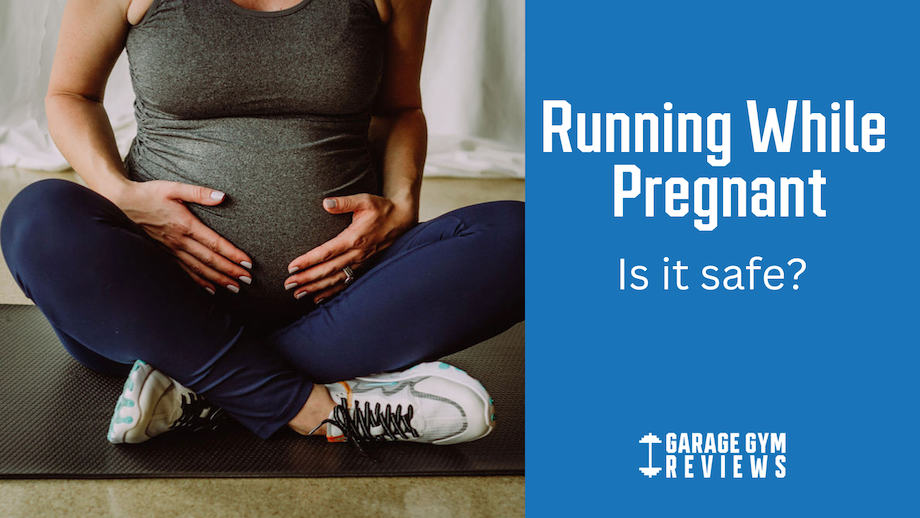If you’ve ever seen a pregnant woman running and done a double-take, you’re probably not alone. Kate Meier, GGR Head of Content, ran a 10K when she was 34 weeks pregnant with her son and can still remember the looks she got.
And whether your reaction was out of concern—or just plain awe—it’s probably because pregnant runners are just not the norm. But, that certainly doesn’t mean running while pregnant isn’t safe.
There are some deeply seeded misconceptions about what type of exercise pregnant people should—or shouldn’t—do. The first physical activity guidelines for prenatal fitness were released by the American College of Obstetricians and Gynecologists (ACOG) in the mid-’80s, and let’s just say the current guidelines look quite a bit different.
I’ve gone through two pregnancies—and ran during my first one well into the second trimester— plus I’m a certified personal trainer with a focus in prenatal fitness, so I’m here to share what I know. Let’s bust some myths about running while pregnant, plus outline the benefits and potential risks of running with child.
Medical disclaimer: This article is intended for educational and informational purposes only. It is not a substitute for health or medical advice. For medical advice, contact an appropriate healthcare provider.
History of Prenatal/Postpartum Physical Activity Guidelines
Although research was conducted and recommendations were given about prenatal fitness as far back as the 18th century,3 it wasn’t until 1985 that ACOG officially released its recommendations, a majority of which are still upheld today, including:
- Regular exercise three times per week is encouraged.
- Vigorous exercise should be preceded by a warm-up and followed by a cool-down.
- Take care when standing up from the floor.
- Women who have sedentary lifestyles should begin an exercise routine with low-intensity exercise and gradually increase activity levels.
There were other initial guidelines8, however, that have been shown to be outdated. They include:
- Then: Maternal heart rate should not exceed 140 beats per minute.
- Now: Instead of indicating a particular heart rate, ACOG suggests using an RPE scale or talk test, as your fitness level pre-pregnancy will influence your normal heart rate range significantly.
- Then: No exercise should be performed in the supine position (on the back) after month four of gestation.
- Now: The risk of laying on your back—especially later on in your pregnancy—lies in potentially compressing the vena cava, the main vein that carries blood from your lower back to your heart. Sleeping on your back is not recommended during pregnancy because of this, but if you’re experiencing a healthy pregnancy and will just be on your back for a short period of time for an exercise, it should be just fine5.
- Then: Maternal core temperature shouldn’t exceed 100.4 degrees Fahrenheit.
- Now: More generally, in their guidance around hot tubs6, ACOG says women shouldn’t let their core temperature exceed 102.2 degrees Fahrenheit. Basically, if you feel like you’re overheating, you probably are and should find a cool spot to rest.
- Then: “Ballistic” movements—or bouncy movements, like running—should be avoided altogether.
- Now: ACOG recommends that pregnant women avoid the following exercises: Contact sports, skydiving, sports that may result in a fall like downhill skiing or horseback riding, hot yoga and pilates, scuba diving, and any activities performed above 6,000 feet (if you don’t already live at a high altitude).
Is Running While Pregnant Safe?
According to Dr. Carolyn Cokes, OB/GYN at Family Childbirth and Children’s Center at Mercy Medical Center in Baltimore, MD, these days, most OB/GYNs will tell you that if you’re experiencing a healthy, low-risk pregnancy, running during pregnancy is safe.
“One thing to keep in mind is that if you weren’t running marathons prior to pregnancy, now is probably not the time to start doing long distances like that,” says Dr. Cokes. “But if you already run, then you can likely keep up similar distances in pregnancy. I recommend setting your expectations low, though—now is not the time to be achieving PRs.”
Another thing to consider: Did you exercise at all before conceiving?
“If you didn’t exercise prior to pregnancy, I typically recommend you start with a walking regimen,” continues Dr. Cokes. “You could build up to running short distances during those walks, but I would save heavy-duty training programs for after you’ve delivered and your pelvic floor has had time to recover.”

TL;DR: Always check with your doctor, but if you were active before pregnancy, running should be a safe exercise for you to continue.
Benefits of Running While Pregnant
Exercise during pregnancy has been shown to have numerous benefits, for both mom and baby.
According to ACOG4, exercise during pregnancy has been shown to support lower incidences of:
- Excessive weight gain
- Gestational diabetes
- Gestational hypertension and preeclampsia
- Preterm birth
- Cesarean sections
- Lower birth weight
Running, in particular, will promote the cardiovascular health of the mother, as well as have a beneficial mental health impact as well.
A recent study from the University of Virginia also found that maternal exercise habits can have beneficial effects on the baby long-term, too, reducing their chances of developing metabolic diseases like diabetes later in life. In fact, lead researcher on the study, Zhen Yan, told UVA Today that most of the chronic diseases that are rampant across the American population today have “fetal origin.”
A recent study from the University of Virginia also found that maternal exercise habits can have beneficial effects on the baby long-term, too, reducing their chances of developing metabolic diseases like diabetes later in life.
Risks of Running While Pregnant
Although exercising while pregnant has been shown to be an overwhelming positive thing to do for those who were active before conceiving, some potential risks have been cited including:
- Placenta hypoxia, which can lead to preeclampsia
- Low birth weight
- Preterm labor and premature birth
- Miscarriage
However, as a study7 in the British Journal of Sports Medicine points out, there’s little evidence to support these risks.
What’s more important to be concerned with, especially if you’re running while pregnant, is just listening to your body. If you’re extremely uncomfortable, or experience any alarming symptoms like vaginal bleeding or chest pain, stop and consult your doctor.
“Remember to stay hydrated before, during and after the run, preferably with some of your fluid intake containing electrolytes,” says Dr. Cokes. “Take breaks to walk or slow down if you feel like you’re getting too out of breath. In general, I recommend a ‘conversational’ pace. Although some athletes can likely safely continue doing speed workouts during pregnancy, almost all will need to slow down.”
What to Expect Running While Pregnant
It will come as no surprise that running while pregnant is a pretty different experience than running when you’re not. Also, running during your own individual pregnancies can even be a unique experience. (I can personally attest to this, having been pregnant twice and being able to run during my first but not my second.)
Here are some things to keep in mind if you’re running while pregnant:
Your Center of Gravity Changes
With extra weight and a growing belly, your center of mass will change, shifting forward as the baby grows and your stomach expands. This is different for every woman, but typically, you’ll begin to notice a pull forward in your second trimester, and it will become a huge factor during your third trimester. What this means for running is that your posture and gait could potentially change to accommodate the shift. Keep an eye on this, as well as any low back pain or hip pain you may experience from it. As a result, your balance may be off, so take extra precautions as your body changes.

Your Ligaments and Joints Will Be Lax
During pregnancy, the aptly named hormone1 relaxin is circulating to help relax the muscles and loosen the ligaments and joints, particularly in the pelvic area, as your internal organs literally shift to accommodate a growing baby and prepare for childbirth. While this is a good thing, it can also leave you feeling achy and, because your joints are more lax, more susceptible to injury.
Be cognizant of your form, wear supportive shoes, and stretch to help cope with any aches and pains that arise.
Your Breast Size Will Increase
According to the American Pregnancy Association2, on average, a pregnant woman may notice a one- to two-cup size increase throughout the course of her pregnancy. This will probably require more support in the form of a larger or more supportive sports bra, particularly as you get closer to your due date and definitely after you deliver (hello, breastfeeding boobs).
Your Vision is Obstructed
This is more of a practical thing, but once you get into your third trimester, you most likely won’t be able to see your feet because of your baby bump, thus making it harder to spot any obstacles on the ground in front of you. Just because of this, proceed with extra caution if you’ll be running in your third trimester.
You May Run Out of Breath Sooner
I’m a pretty active person and consider myself to be in good shape, but when I was pregnant, a walk down the driveway would wind me. Shortness of breath is normal during pregnancy, in the first trimester because hormones are signaling your body to carry large amounts of oxygen to your growing baby, and into the third trimester simply because the baby is pushing on your organs making it hard for the lungs to expand fully. (Pregnancy is truly a joy, isn’t it?)
If you’re used to smashing a 7-minute-mile, know that you’ll probably feel the need to scale that back as respiration becomes more challenging.
You’ll Probably Have to Pee A Lot
One of the first signs of pregnancy is increased urination—why? Your body has to increase blood flow to support your growing fetus, and to process this blood, your kidneys have to produce more fluids than usual. Then, toward the end of pregnancy, your growing uterus will put physical pressure on the bladder, essentially reducing its capacity until the baby is born.
This is one reason why, in the third trimester, running might be a struggle—two steps in and you already have to pee. If you’re set on running but have concerns about incontinence, consider wearing a pad just to protect your clothing and make yourself more comfortable while you’re hitting the pavement.
How Far Can I Run When I’m Pregnant?
The answer to this question depends on your fitness level prior to getting pregnant, as well as the health of your current pregnancy. If you were a marathoner before you conceived, odds are, you’ll be able to run quite a ways while pregnant and still feel pretty good. On the flip side, if you weren’t active before pregnancy, you probably won’t be able to run very far. Either is OK.
ACOG recommends that pregnant women get 150 minutes of moderate-intensity aerobic activity weekly. That breaks down to five 30-minute sessions. If you could run two to three miles during that 30 minutes, you’d hypothetically rack up between 10 and 15 miles per week—pretty impressive for anyone, let alone a pregnant person.
Things to Consider
As with most things throughout the course of your pregnancy, listening to your body is key.
Take Kate for example: She had been a runner for years prior to conceiving her first child, but still had concerns about doing too much or putting too much strain on her body.
“I have miscarried in the past, and if you’ve ever had a miscarriage, that fear is cemented in your brain,” Kate explains. “My approach to running changed after learning I was pregnant. I slowed my pace, no longer striving to do 7- or 8-minute miles and instead enjoying 10-minute miles, even in the early weeks of the pregnancy (I was also so sick during my first trimester that running at all was a challenge). As a highly experienced runner, I knew my pacing by feel, but I also wore a Garmin as a reminder and tried to make sure I would pass the “talk test” during my workouts.”
Here are a few considerations you should make before you set out on a jog while pregnant:
Proper Nutrition and Hydration
Proper nutrition and hydration is key before and after a run even when you’re not pregnant, but especially when you are. Water is vital during pregnancy, as it helps form the amniotic fluid that surrounds the fetus. ACOG recommends that you drink 8 to 12 cups of water per day during pregnancy.

Food is also important. The American Pregnancy Association says that you’ll need 300 extra calories per day in the second and third trimesters to support your baby’s growth and development. Especially if you’re exercising consistently, proper fuel is key.
Appropriate Footwear
Consider purchasing running shoes if you don’t already have some, as they’ll make your run much more comfortable and safe. Many running stores will offer a free fit check if you’re unsure of what kind to buy. And remember, it’s not uncommon for your feet to swell or even grow, during pregnancy, so take that sizing into consideration during your purchase.
RELATED: Best Treadmill Running Shoes
Consider a Belly Support Band
They’re definitely not cute, but a belly band can help provide some support for your growing stomach and ease back, pelvis, and hip pain. They could be especially helpful if you get into your third trimester and are still running. Heck, I wore one in my third trimester and wasn’t even running—no shame!
Final Thoughts on Running While Pregnant
Running while pregnant can have beneficial effects on both mom and baby.
- Exercise during pregnancy has been shown to decrease risk of gestational diabetes, high blood pressure, and excess weight gain, among other things.
- If you were a runner before you conceived and are experiencing a healthy pregnancy, it’s probably just fine for you to continue running while pregnant.
- If you weren’t active before pregnancy, it’s best to stick to walking and turn to running postpartum, after the baby is born and you’ve recovered.
- Regardless, consult your OB/GYN if you plan to run while pregnant, just to make sure it’s safe for you.
Running While Pregnant Q&A
Here are some frequently asked questions about running while pregnant.
Can running while pregnant hurt the baby?
In a healthy pregnancy, no, running while pregnant won’t hurt the baby. If anything, it has plenty of health benefits!
Is it healthy to run while pregnant?
If you were a runner before you got pregnant, yes, you can definitely still continue running throughout pregnancy if your body is up for it. If you weren’t active before pregnancy, it’s best to stick with walking or biking to get your cardio in.
RELATED: Biking vs Walking
When can you start running during pregnancy?
This is totally subjective to each person. If you feel up for it in your first trimester, go for it, although many women experience extreme fatigue, nausea, vomiting, and other digestive issues that make running feel like the last thing they’d want to do. The second trimester is known as the sweet spot, when your energy is most likely to return and symptoms of morning sickness subside, so months four to six might be the best bet.
When should you stop running while pregnant?
Unfortunately there isn’t a universal answer to this question either—listening to your body is your best bet here. For many women, running in the third trimester is simply uncomfortable because of the added weight, lax joints, and overall dip in energy levels. You should always consult with your doctor about your plan for running while pregnant.
References
- Back pain in pregnancy. Back Pain in Pregnancy – Health Encyclopedia – University of Rochester Medical Center.
- Breast changes during pregnancy. American Pregnancy Association. Published January 31, 2023.
- Downs DS, Chasan-Taber L, Evenson KR, Leiferman J, Yeo S. Physical activity and pregnancy: past and present evidence and future recommendations. Res Q Exerc Sport. 2012 Dec;83(4):485-502. doi: 10.1080/02701367.2012.10599138. PMID: 23367811; PMCID: PMC3563105.
- Exercise during pregnancy. ACOG.
- Exercise in pregnancy. NHS choices.
- Hot tubs during pregnancy. American Pregnancy Association. Published December 9, 2021.
- Lysdahl Fahrenholtz I. Is it safe to exercise during pregnancy? British Journal of Sports Medicine Blog. Published July 16, 2019.
- Riczo, Deborah. ACOG’s guidelines for exercise during pregnancy and postpartum: Accepted or contested? 1987.







